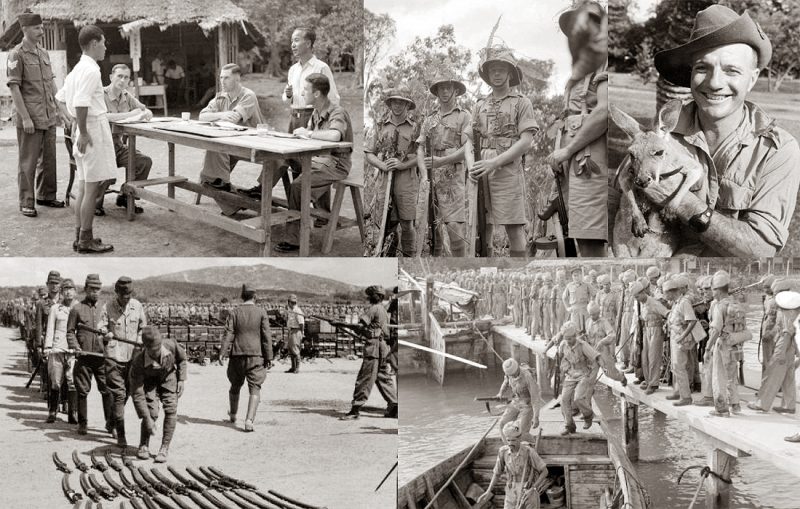Photo story (Clockwise from top left): (1) The Royal Air Force police interrogating a Korean prison camp guard in Malaya during 1945-46 (2) British Army in Malaya in 1941 (3) An Australian soldier holds a Kangaroo which was smuggled into Malaya in 1942 (4) British Indian troops in Johore, Malaya on 13th November 1941 (5) Japanese surrender in Malaya in 1945
In January 1946, dozens of Royal Air Force Stations in South Asia and India mutinied over service conditions and conditions of slow demobilization after the end of WWII. The mutiny started at Karachi, British India (Now in Pakistan) and later around 50,000 men in over 60 RAF stations got involved in India, Ceylon and as far as Singapore. The largest RAF base at that time at Kanpur, British India was also among the rebelled outposts.
The three to eleven days long mutiny was peaceful. The major grievance of the mutineers was a sluggish demobilization of British armed forces to Britain, use of British ships for transporting U.S. troopers and other resentments.
The British Government claimed that there were inadequate provisions for a quick demobilization. However, reports which were declassified later showed that the British forces were retained in the region to deal with possible unrests by local citizens for independence, especially in India. According to the reports, communist support and significant political views also acted as major catalysts for the Mutiny.
Some of the mutineers faced courts-marshal and the RAF mutiny events were resolved. However, these events instigated Mutiny of Royal Indian Navy and Royal Indian Air Force in February 1946 in which 78 out of total 88 ships revolted. Lord Wavell, Viceroy of India, said that the example of RAF, who had gotten away with what had been really a mutiny, had some responsibility for the situation.
Online archive of weekly British conservative magazine, The Spectator reported on the RAF Parachute Battalion Mutiny of 1946 in Malaya. It was published on the 2nd page of 11th October 1946 issue of the magazine.
British Malaya was a set of Malay Peninsula states and the Singapore Island which were under British control from 1874 to 1946. Malaysia became fully independent in 1957. Singapore was expelled from Federation of Malaysia by a voting in Malaysian parliament and gained independence in 1965. RAF Parachute Battalion Mutiny of 1946 occurred in Muar (also known as Bandar Maharani) in Johor state, Malaysia.
British Allied forces fought the Japanese forces during the battle of Malaya from 8th December 1941 to 31st January 1942. Battle of Muar was fought between 14th to 22nd January 1942 and Battle of Bakri on 17th January 1942. Battle of Bakri was a failure which resulted in near annihilation of 45th Indian Infantry Brigade and heavy casualties for Australian forces and eventual fall of Muar to the Japanese forces. Japan occupied Malaya from 1942 to 1945.
Captain Frederick J Bellenger, British Secretary of state for war during the RAF Parachute Battalion Mutiny of 1946, admitted that the conditions at Muar camp had been quite bad. It was a tented camp and unexpected heavy rainfall converted the dusty ground into deep mud. Bellenger also said that the camp lacked proper facilities for feeding, cooking, washing, lighting and recreation. He also indicated that the most important catalyst for the mutiny was the transitional stage between war and peacetime system of administration. His statement came after 243 paratroopers of the camp convicted of mutiny were sentenced to two years in prison.
266 men of the 13th Parachute Battalion at Muar Camp had repeatedly refused to obey commands on 14th May 1946. On the evening of 13th May 1946, there were discontent in the canteen and the word ‘strike’ was reportedly heard. Two inquiry courts were assembled on 17th & 22nd May 1946, one to inquire into the conditions in Muar Camp and the other into the causes of mutiny. It was decided that 258 troopers concerned must be brought to a trial for mutiny.
In case of the 243 convicted paratroopers, the sentence had been reduced from 3 years imprisonment to two years imprisonment with hard labor. Captain Bellenger defended military authorities reminding that maximum punishment for committing mutiny offense was death. But nearly two hundred MPs signed a petition expressing their ‘shocked surprise’ and called for annulment of the sentences.
Effort by the MPs could be justified as the London Evening News reported that downpours soaked the troopers as they had lain beneath the canvas all night. The newspaper also reported that there had been ankle high water in the tents and the men were ordered to parade every morning washed and shaved with no practical washing facilities at all.
There was an outcry in Britain within days of the court’s decision. Half a million signatures were collected in the petition to release them. All the men were soon released and officially it was on technical grounds. The judge had discovered ‘irregularities of substantial nature’ with the courts martial. But such irregularities were a common thing with courts martial. And there could be little doubt that it was the pressure of public opinion that ensured the release of the 243 paratroopers of the 13th Parachute Battalion at Muar Camp.
http://www.youtube.com/watch?v=QLx0V0GK4-A
Video story: Documentary on WWII in Malaya from 1941-1945; the dark period of Japanese occupation of Malaya.
